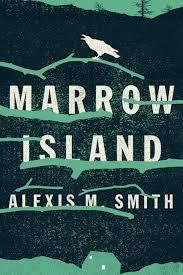Take a photo of a barcode or cover
Smith laid the whole "evil/broken bisexual" trope on a little thick for my tastes, but I did love her nerding out over Pacific Northwest geography/environment, climate issues, and mycology.
This is one of those novels that have everything I like in a book. A remote setting, a narrator with a complicated past, an island full of nature-worshipping hippies, and a lot of secrets. It’s also one of those novels that have a massive amount of potential but end up being “Meh.”
Lucie Bowen left Marrow Island after an earthquake destroyed everything. It damaged the refinery, which killed Lucie’s father and polluted the island so badly that it became uninhabitable. When Lucie moves away from the island, she leaves behind her best friend and occasional lover, Kate. Twenty years after the earthquake, Kate writes to Lucie and tells her that she has moved back to Marrow Island. Kate is part of Marrow Colony, a group of religious hippies who are using mushrooms to repair the environment. Lucy eagerly goes to visit her old friend, but after a night of partying with the colonists, she finds herself in deadly trouble.
The story takes place on two timelines. In the present day, Lucie is living in a ranger station and dealing with the fallout of the events that occurred on Marrow Island. Kate is in prison. There are flashback chapters that show what happened on the island. I love this structure because it builds tension. Lucie is still really messed up from her near-death experience in Marrow Colony. She’s also still involved with the colonists, even though they almost got her killed, and most of them are in prison. I kept reading because I had to know what happened at the Colony. What secrets were they hiding? What did they do to get themselves thrown in jail?
The setting in this book is beautifully described. It made me want to visit the Pacific Northwest. If you’re interested in climate change and environmental issues, I’d recommend this novel. To me, it seems very realistic and well-researched.
My main issue with Marrow Island is the pacing. It feels like it takes forever for the action to get started, and once it does start, it’s over quickly. Lucie is a very self-absorbed person. She spends most of her time alone in the forest, thinking about her life. She doesn’t have any meaningful connections with other people, so most of the characters are flat. They’re just random acquaintances. The reader doesn’t learn much about them. I didn’t find Lucie’s thoughts very compelling to read. I wanted her to do something. Or meet someone. Or think about something besides herself.
When she (finally!) reaches the island, she gets a long lecture about mushrooms and the environment. Again, I had a hard time staying interested in this. Before Lucie became a self-obsessed forest-wanderer, she was a newspaper reporter, so I expected her to immediately start digging for Marrow Colony’s secrets. She didn’t. She got high and discovered the secrets by accident. I guess that’s realistic, but after spending so many pages waiting for something to happen, I was slightly disappointed. I wish Lucie had more agency. Most of the events in this book seem like accidents.
Maybe this book would have benefitted from being longer? It’s quite short. I think I would have liked more past-Lucie and less present-Lucie. More time on the island would have helped me understand the other characters better. I wasn’t always sure about their motives.
If you’re interested in environmental issues, then this book is worth reading, but I was disappointed with the meandering plot and underdeveloped characters.
TL;DR: Too much navel-gazing, not enough action.
Lucie Bowen left Marrow Island after an earthquake destroyed everything. It damaged the refinery, which killed Lucie’s father and polluted the island so badly that it became uninhabitable. When Lucie moves away from the island, she leaves behind her best friend and occasional lover, Kate. Twenty years after the earthquake, Kate writes to Lucie and tells her that she has moved back to Marrow Island. Kate is part of Marrow Colony, a group of religious hippies who are using mushrooms to repair the environment. Lucy eagerly goes to visit her old friend, but after a night of partying with the colonists, she finds herself in deadly trouble.
The story takes place on two timelines. In the present day, Lucie is living in a ranger station and dealing with the fallout of the events that occurred on Marrow Island. Kate is in prison. There are flashback chapters that show what happened on the island. I love this structure because it builds tension. Lucie is still really messed up from her near-death experience in Marrow Colony. She’s also still involved with the colonists, even though they almost got her killed, and most of them are in prison. I kept reading because I had to know what happened at the Colony. What secrets were they hiding? What did they do to get themselves thrown in jail?
The setting in this book is beautifully described. It made me want to visit the Pacific Northwest. If you’re interested in climate change and environmental issues, I’d recommend this novel. To me, it seems very realistic and well-researched.
My main issue with Marrow Island is the pacing. It feels like it takes forever for the action to get started, and once it does start, it’s over quickly. Lucie is a very self-absorbed person. She spends most of her time alone in the forest, thinking about her life. She doesn’t have any meaningful connections with other people, so most of the characters are flat. They’re just random acquaintances. The reader doesn’t learn much about them. I didn’t find Lucie’s thoughts very compelling to read. I wanted her to do something. Or meet someone. Or think about something besides herself.
“So much of our thinking is involved with things we’ve already done and things we have yet to do. It’s almost impossible not to be thinking about some future moment or some past mistake or tragedy.” – Marrow Island
When she (finally!) reaches the island, she gets a long lecture about mushrooms and the environment. Again, I had a hard time staying interested in this. Before Lucie became a self-obsessed forest-wanderer, she was a newspaper reporter, so I expected her to immediately start digging for Marrow Colony’s secrets. She didn’t. She got high and discovered the secrets by accident. I guess that’s realistic, but after spending so many pages waiting for something to happen, I was slightly disappointed. I wish Lucie had more agency. Most of the events in this book seem like accidents.
“When I let go of my own work, my own priorities, I lost the qualities he had been attracted to in the first place. That's how he put it. He loved the woman I was before I was in love with him.” – Marrow Island
Maybe this book would have benefitted from being longer? It’s quite short. I think I would have liked more past-Lucie and less present-Lucie. More time on the island would have helped me understand the other characters better. I wasn’t always sure about their motives.
If you’re interested in environmental issues, then this book is worth reading, but I was disappointed with the meandering plot and underdeveloped characters.
TL;DR: Too much navel-gazing, not enough action.
This is one of those books where I felt lost the majority of they time and kept flipping back to try and see what I missed. Some beautiful moments but ultimately disappointing.
**3.5 stars**
Recommended to me by a friend, this is a backlist page-turner that turned out to be a part post-apocalyptic, part mystery, part drama that I read very quickly! At under 250 pages, and set in the Pacific Northwest, this is a great one to read over a weekend. I've seen it compared to Station Eleven; I wouldn't go that far, since it's one of my favorites, but it does have that dark, mysterious flare that kept me hooked through the end.
Recommended to me by a friend, this is a backlist page-turner that turned out to be a part post-apocalyptic, part mystery, part drama that I read very quickly! At under 250 pages, and set in the Pacific Northwest, this is a great one to read over a weekend. I've seen it compared to Station Eleven; I wouldn't go that far, since it's one of my favorites, but it does have that dark, mysterious flare that kept me hooked through the end.
emotional
mysterious
reflective
medium-paced
Plot or Character Driven:
Plot
Strong character development:
Complicated
Loveable characters:
Yes
Diverse cast of characters:
Yes
Very good. It’s a different sort of post-apocalyptic novel, taking place after a catastrophic west coast earthquake. The settings and characters are rich and a little unknowable, making for a decent build-up of tension into the final act. Lots of ecological talk here (see also: Barkskins), but I like that our suspense fiction is taking us to realistic future places for the ultimate horror/meltdown moments.
adventurous
dark
informative
sad
tense
slow-paced
Plot or Character Driven:
Character
Strong character development:
No
Loveable characters:
No
Diverse cast of characters:
No
Flaws of characters a main focus:
Complicated
Ugh. How could a book about a cult, located on a small island in the Pacific Northwest, be this boring? It was so frustratingly hard to follow with complete unnecessary time jumps. Just TELL THE STORY.
Except it felt like the author did everything but tell the story. Jumping back and forth referring to some mysterious SOMETHING that happened. But at 65-70% of the way through, it still hadn't. There was no build up or even much cultishness until that point. A lot of nothing happening, and then a few anticlimactic things. All of the things in the book that could have been interesting (Devastating earthquake! Inheritance of an old house with significant emotional value! CULT!) were ignored in favor of nothing really happening. Every time I thought I'd found a thread to hold on to, the plot and even worse the actual timeline shifted and it was neglected, which left me struggling to follow what was going on and struggling even more to care. JUST TELL THE STORY. Straight through. In order.
Except it felt like the author did everything but tell the story. Jumping back and forth referring to some mysterious SOMETHING that happened. But at 65-70% of the way through, it still hadn't. There was no build up or even much cultishness until that point. A lot of nothing happening, and then a few anticlimactic things. All of the things in the book that could have been interesting (Devastating earthquake! Inheritance of an old house with significant emotional value! CULT!) were ignored in favor of nothing really happening. Every time I thought I'd found a thread to hold on to, the plot and even worse the actual timeline shifted and it was neglected, which left me struggling to follow what was going on and struggling even more to care. JUST TELL THE STORY. Straight through. In order.
I liked the slowly revealed mystery against the backdrop of advancing climate change, but I disliked the ambiguous ending. I really appreciated the strong presence of queer characters and women in the story (the main character is a bisexual woman, by the way), without making their sexuality an overwhelming part of the story. Characters happen to be queer in the same way most characters in other works happen to be straight.



